I’m (obviously) a huge beauty enthusiast, but never knew what to think about essential oils in skincare. While I’ve spoken to many skincare experts who say it’s best to avoid them at all costs, there are others out there who completely swear by them. Essential oils are great for aromatherapy, uplifting the senses, and promoting a sense of serious relaxation, but are they well and truly bad for your skin? I wanted to do a little more investigating.
While you definitely should avoid them if you’re allergic or have super sensitive, reactive skin, I can also tell you that I was pleasantly surprised by how well some of them worked for my own skin. I was surprised by this for two reasons. One, I have extremely sensitive skin that’s prone to redness. I’d always been told that essential oils are a big no no if your skin even remotely deals with those things. Second, my skin is also prone to breakouts and inflammation if I’m not careful about what I use. Trying out products with essential oils for the first time felt like a huge gamble, but it’s one that really paid off. I actually found that using the right essential oils calmed inflammation and redness for me while helping my skin to feel and appear more hydrated.
Not all essential oils are created equal and some are truly not meant for the skin—that’s probably where some of their bad reputation comes from. Everyone’s skin also behaves differently and you should definitely talk to your dermatologist before trying anything new if you’re treating a specific skin condition. But, if you are interested in learning more about essential oils and if some of them have a place in your skincare routine, keep reading. I talked to a few experts for their take on these magic little plant potions and why they seem to get a bad rap.
Why Do Essential Oils Have a Bad Reputation in Skincare?
If you aren’t super familiar with essential oils and what they are, let me first explain. They’re highly concentrated extracts taken from plants like flowers, seeds, leaves, bark, and roots. They’ve been used in herbal medicine for centuries and can have strong anti-inflammatory and antibacterial effects.
Dermatologists and other skincare experts aren’t wrong to approach essential oils with caution. While many of them can be beneficial for the skin, not all of them are meant to be used in this way. Master aesthetician and lead educator for organic skincare brand LilFox Mikaela MacLean has a few thoughts on this. “I think essential oils can attract negative attention for many reasons,” she says. “Just because something is natural, doesn’t automatically make it safe—like poison ivy. Second, a phrase that gets thrown around in skincare is ‘the dose makes the poison.’ Even if an oil is skin safe, but is not diluted or formulated in a product correctly, you have the possibility of things going awry. Sometimes oils that are well tolerated at first can cause problems if skin is overexposed over time. We also live in a society where money is pumped into concocting synthetic stuff in a lab. Unfortunately, there always seems to be a lack of trusted research, testing, and education for the natural remedies the earth provides for us.”
Additionally, Lauren Busch, a registered nurse and director of production education at DoTerra, says that there are a few other things that have added fuel to the fire when it comes to the bad reputation of essential oils. “Improper use—such as applying certain oils undiluted directly to the skin or using oils that are not pure—can lead to irritation or sensitivity,” she explains. “This has contributed to a perception in some parts of the beauty community that essential oils are harmful. It’s crucial to use high-quality, pure essential oils and to follow recommended guidelines for dilution and application to ensure safety and efficacy.”
What Benefits Can Essential Oils Provide for Your Skin?
Now that we’ve cleared that up, let’s talk about the benefits essential oils can provide. Busch says that when applied topically, certain essential oils can promote healthy-looking skin by providing cleansing, soothing, and rejuvenating effects. Common favorites include tea tree oil for acne and lavender for calming and soothing the skin.
MacLean also shares that the benefits provided depend on the oil and correction dilution of a product is key. Without proper dilution, the product could be irritating. While some oils like frankincense, lavender, tea tree, rose, sandalwood, eucalyptus, and ylang-ylang are skin-safe, others are not. Some can be highly irritating and phototoxic like cold-pressed lime, lemon, and some citrus oils, causing skin reactions so you’ll always want to do your research and ask a professional before trying a new essential oil on your skin.
Can You Use Essential Oils If You Have Sensitive Skin?
This is tricky to answer because everyone’s skin is so different. If you’re sensitive to products, it’s always a good idea to patch test something first anyway, but I can share that my own experience with essential oils has been really positive. My skin is extremely sensitive and reactive, but like I said above, I actually found that they’ve calmed inflammatory acne and really soothe my skin. As a beauty editor, I’m sure you can imagine I’ve used plenty of products over the span of my career and I can say that nothing with essential oils has ever given me a rash or caused a reaction, but other essential-oil free products have.
MacLean also says, “I am also an extremely sensitive and reactive-skinned person, but I love my oils! LilFox uses oils in skincare products, but they are only of the highest quality and formulated by an expert aromatherapist within the correct dilution range of 0.5% to 1%. Frankincense, rose, and galbanum are some of my favorites for skin.”
Busch also has a few tips for anyone who’s sensitive that may want to try out essential oils. She says that it’s advisable to use gentle essential oils known for their soothing properties like lavender and frankincense. These oils are also pretty well-tolerated and can help you maintain healthy-looking skin. Using carrier oils specifically formulated for sensitive skin can also help—ones that include oils like grape seed, hemp seed, rosehip, and meadowfoam. These can help dilute essential oils and will minimize potential reactions. Like I mentioned above, though, Busch says to always perform a patch test before full application to ensure compatibility with your skin.
My Favorite Beauty Products With Essential Oils
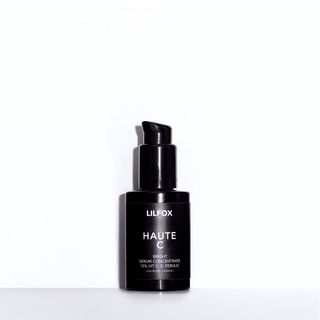
L I L F O X
Haute C Bright Serum Concentrate
This brightening serum from LilFox is a current favorite. Not only does it feature 15% vitamin C and ferulic acid, it also contains soothing essential oils like rosemary and bergamot. I noticed my skin became instantly brighter after using it just a couple times and although it does contain a few essential oils, it still has a nice matte texture anyone who leans oily or acne-prone.
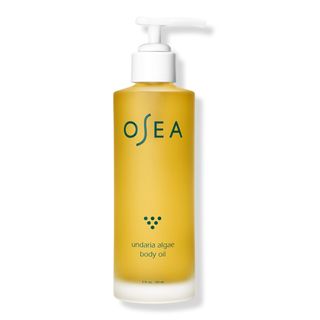
OSEA
Undaria Algae Body Oil
This body oil is a cult-favorite amongst editors and organic skincare enthusiasts. It definitely has a bit of a fragrance so that’s something to be aware of if that’s not your jam, but I absolutely love the smell because it’s light and never overpowering. This contains essential oils like grapefruit peel and cypress which give it a fresh and zingy (yet subtle) scent.
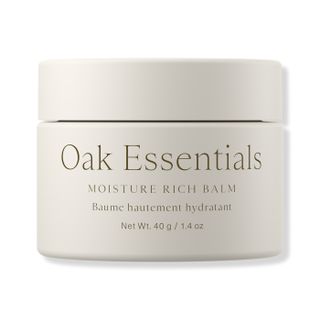
Oak Essentials
Moisture Rich Balm
This rich and decadent balm from Oak Essentials may not be for everyone because it contains heavier oils like coconut. But, I do love to use it once in a while when my skin is extra dry or dehydrated in the winter because it beautifully seals moisture in. It also contains soothing organic oils from lavender, chamomile, and rose.
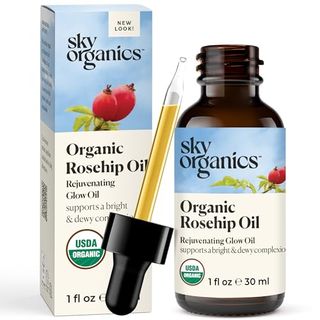
Sky Organics
Organic Rosehip Oil
While this doesn’t exactly contain essential oils, it’s a great carrier oil that still gives your skin such a nice glow and can provide anti-inflammatory benefits.
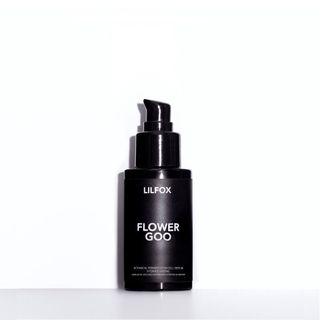
L I L F O X
Flower Goo Botanic Ferment Stem Cell Serum
This stem cell-rich serum is also packed with healing frankincense and bitter orange leaf essential oil. If you struggle with dehydration like I do, it’s a miracle in a bottle. According to the brand, high elevation rose stem cells have been proven in clinical trials to reduce transepidermal water loss by 39%. It increases skin barrier strength and even stimulates the secretion of growth factors to enhance collagen synthesis. All while smelling absolutely amazing. I can’t imagine my routine without this one now along with the brand’s Dewy Bean Dream retinol alternative.
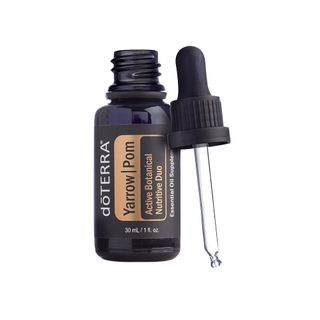
This formula from DoTerra is definitely potent, but can provide serious healing benefits to the skin. It contains yarrow essential oil which is really soothing to the skin while promoting serious hydration. It’s a personal favorite to reach for during these dry winter months in L.A. It does have a pretty strong scent, though, so that’s something else to keep in mind if you’re sensitive to smells.
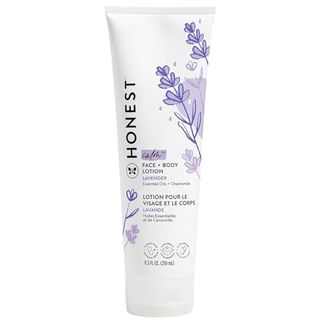
The Honest Company
Calm Hydrating Face + Body Lotion
I normally would not use the same cream on my body and face, but this soothing option from Honest Beauty is the exception. Featuring lavender and chamomile essential oils, it leaves your skin so soft and hydrating while soothing any irritation.
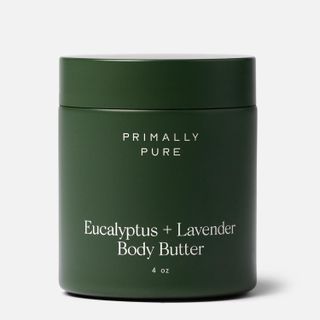
Primally Pure
Eucalyptus + Lavender Body Butter
This body butter is so comforting and leaves my skin feeling extra soft. It features essential oils of lavender and eucalyptus, soothing skin and keeping
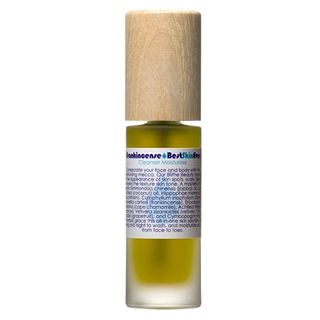
Living Libations
Organic Best Skin Ever – Frankincense
Living Libations offers a host of essential oil-based cleansers and moisturizers. This frankincense option is one of my favorites. It can also double has a body moisture and always leaves my skin feeling so soft and hydrated.
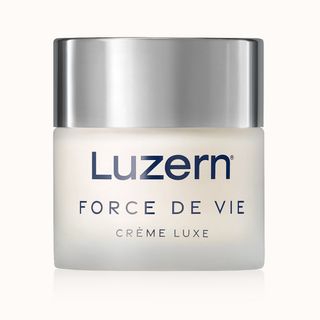
Luzern Labs
Force de Vie Creme
This is one of my all time favorite luxury skincare creams. It leaves your skin with the most incredible glow with lavender oil (which gives it an incredible scent), oxygen, co-Q10, hyaluronic acid, and other fast-penetrating actives. Yes, it’s expensive, but it’s one of the few luxury brands that I think is 100% worth it.
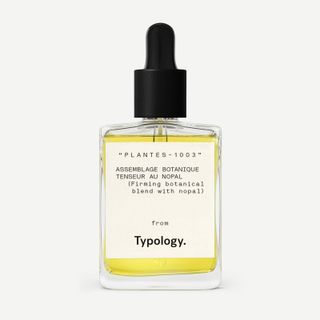
Typology Paris
Firming Night Serum
French brand Typology offers this firming night serum with immortelle essential oil which works to increase collagen production and has anti-inflammatory properties. Lavender oil also provides soothing, regenerating, and doubles the formula’s anti-inflammatory properties.















